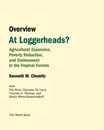Description
Preserving the world’s rapidly shrinking tropical forests and improving the economic prospects of millions of poor people requires an urgent strengthening of national forest governance. Globally, this calls for strong financial incentives, says a new World Bank policy research report, “At Loggerheads? Agricultural Expansion, Poverty Reduction and Environment in the Tropical Forests.”
A majority of people in rural tropical areas—about 800 million—live in or around vulnerable forests or woodlands, depending on them heavily for survival. Yet deforestation at five percent a decade is steadily depleting this resource base, contributing to 20 percent of annual global CO2 emissions and seriously threatening biodiversity.
In Latin America, dense tropical forest is often cleared to create pastures worth as little as $300 a hectare, while releasing large amounts of carbon dioxide. In Africa and Asia, some deforestation is equally unproductive. These forests may be worth five times more if left standing, providing carbon storage services, than if cleared and burned. If developing countries could tap this value, they could also stimulate more productive agriculture in degraded areas, while preserving the environmental services of forests.
Information
- Author(s)
- K.M. Chromitz
- Publisher
- The World Bank
- Date / journal vol no.
- 2007
- Pages
- 32
